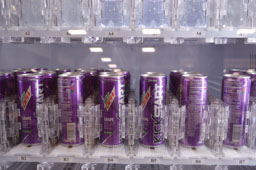Caffeine craze: The impact caffeine is having on NHS students

September 21, 2022
The aroma of coffee fills the room and the quiet whirring of machinery is accompanied by small chatter. The sights, smells, and sounds that fill a coffee shop are not unfamiliar for those who enjoy ordering their caffeinated beverages. This atmosphere is making its way to Noblesville High School’s library this coming year, and both students and staff alike say they are gearing up in anticipation.
Caffeine lovers throughout the school are buzzing with excitement about the idea of this coffee bar. The new establishment will be located in the library, and the media specialists are finishing up construction. However, worries about the coffee bar’s potential impact have risen amongst students and staff, who believe the negative effects of caffeine may outweigh the benefits of adding the shop to the school in the first place.
Caffeine, which is found in beverages like coffee and energy drinks, has raised concerns among medical professionals because of its effects on the mind and body. America is a leader in caffeine consumption, with over 90% of adults indulging in the substance, according to the National Library of Medicine. Studies have shown that caffeine can cause an increase in nervousness, as well as fuel mood swings, and many users suffer from chest pain, headaches, or increased heart rates. Counselor Cosette Fehribach has noticed some of these symptoms in students here at Noblesville.
“I’ve definitely had students who, not necessarily with coffee, but with energy drinks [have had] mood swings, irritability, and [use] it as a substitute for bad sleep cycles,” Fehribach said. “All the research shows that yes, it can increase alertness, but it’s not a substitute for good sleep. It won’t get you to the same brain level function you would otherwise.”
Fehribach is a frequent coffee drinker, but they choose to only drink pour over coffee, which is brewed by pouring hot water over coffee grounds. They also limit themselves by not drinking coffee on weekends.
“It’s interesting … what the coffee bar will do at the high school level, just because things are good in moderation. I just don’t know what the self control is of sleep-deprived high schoolers,” Fehribach said.
Other health professionals have also raised their concerns about beverages like coffee and energy drinks.
“Caffeine is the most socially acceptable drug to be addicted to,” Noblesville health teacher Patrick Hopkins said. “If teens, and people in general, become addicted to caffeine, especially early in life, they could develop an unhealthy dependence on caffeine.”
Hopkins says he makes sure to prioritize getting a good sleep cycle, and mentions that a balanced sleep schedule is the number one thing you can do to keep yourself healthy.
“Students are relying on pop, soft drinks, energy drinks, and coffee to wake them up and carry them through the day,” Hopkins said. “Being tired or getting very little sleep seems to be a badge of honor for some people.”
Although many caffeine drinkers don’t realize, studies show that consuming more than 400 mL of caffeine per day — about 2-3 cups of coffee — is unhealthy and can create a dependence. Caffeine addictions often go unnoticed, but they occur when individuals consume so much of the substance that they can’t function without it at the same level as they normally would. Scientists believe that reliance on caffeine is becoming an alarming problem, specifically in America, where coffee and energy drinks are easily accessible, even in places like schools.
“There are withdrawal symptoms whenever you have a really high caffeine intake and then suddenly go off of it,” Fehribach said.
Noblesville wellness teacher Scott McClelland agrees with the idea that heavy caffeine usage is a serious issue at NHS.
“[Caffeine] like any addiction, should be taken seriously…people feel like they must have [caffeine] to get their morning started,” he said, furthering the notion that too much of the substance can alter people’s habits and behaviors.
According to professionals, having a few caffeine-filled drinks every once in a while won’t be detrimental to your health — as long as you’re mindful and aware of your intake. Most people believe that energy drinks and coffee have their purpose, and they can be both delicious and beneficial to those who don’t abuse them. Researchers advise students to monitor their drinking habits is crucial to maintaining your health, and with the development of the coffee bar on its way, both staff and students are curious to see what will happen to those students who need a little pick-me-up early in the morning.




